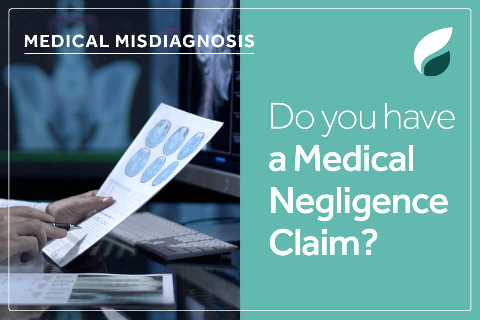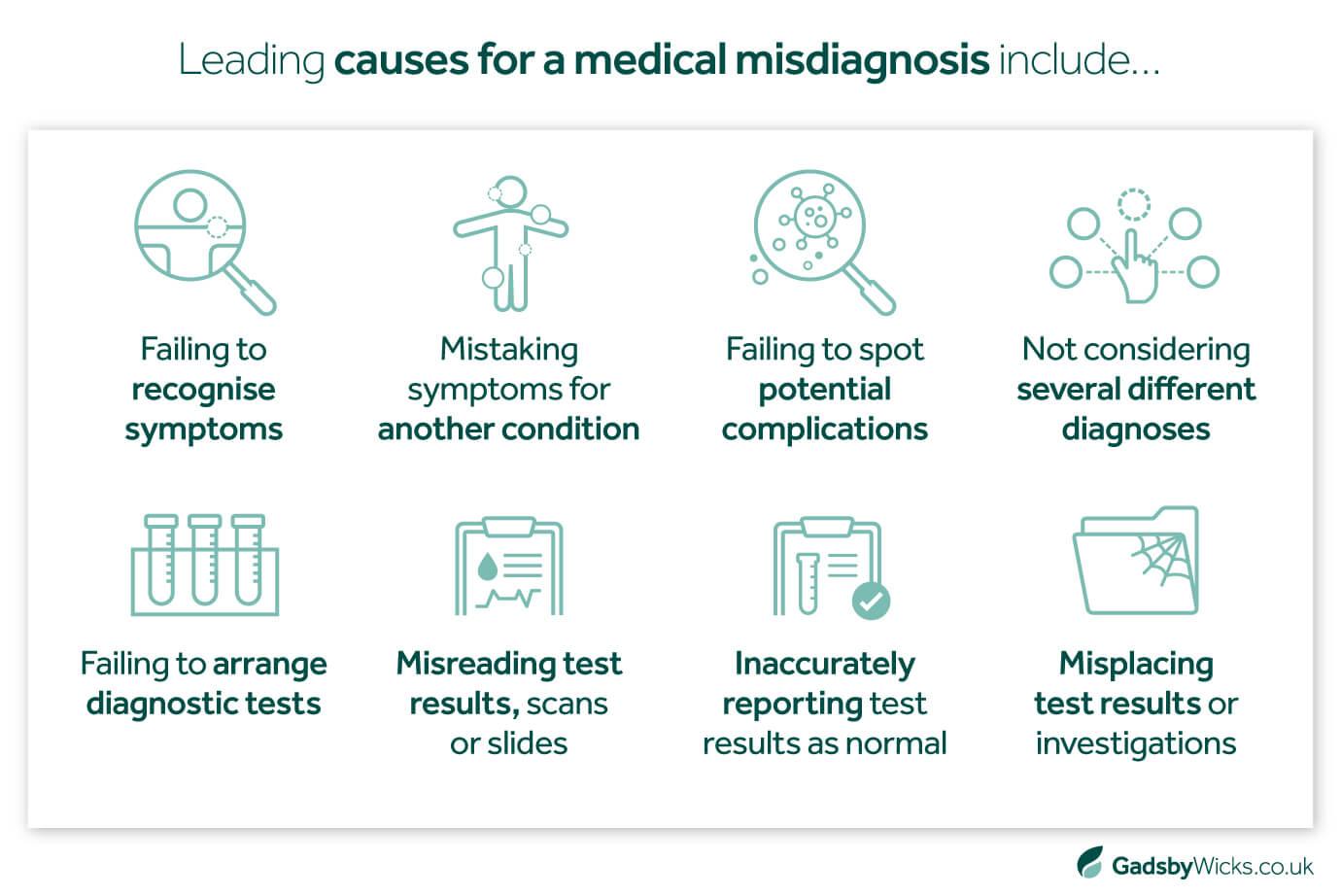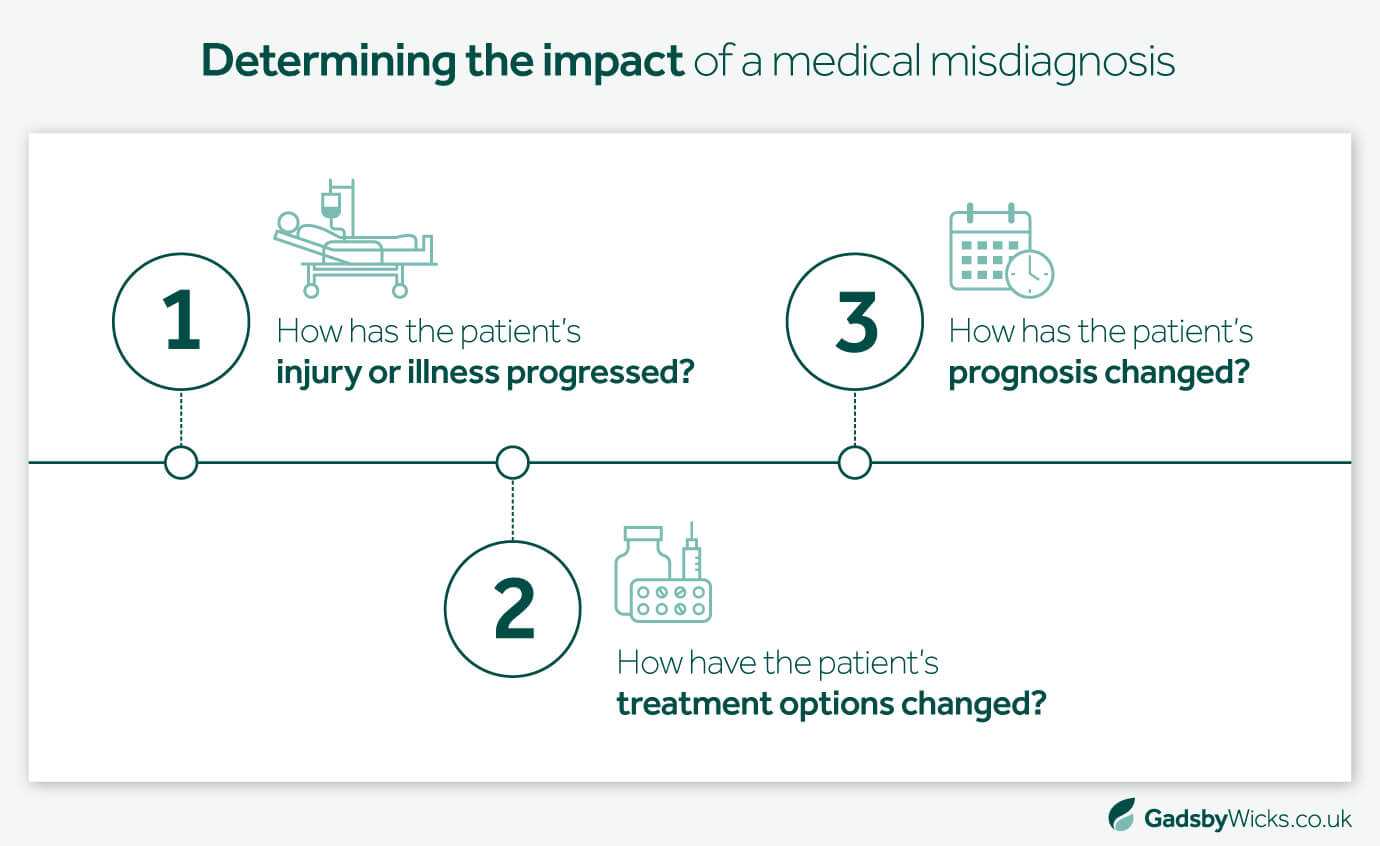- Home >
- Misdiagnosis Claims
We trust healthcare professionals to take reasonable steps to identify and manage our welfare. However, when symptoms are overlooked or errors are made, the wrong diagnosis can have serious consequences on your health.
If you or someone you love was misdiagnosed, and this led to delayed treatment, incorrect treatment, or no treatment at all – our misdiagnosis claims solicitors can help. With over 30 years of experience and millions recovered in compensation, trust our team to fight for your right to compensation, answers and justice.

Do you have a misdiagnosis claim?
The human body is complex, and it is unreasonable to expect healthcare professionals to get diagnoses right every time. But when negligent acts cause a preventable misdiagnosis, the impact on someone’s long-term health can be life-altering.
From misplaced test results and failing to recognise clear symptoms, to misreading scans and slides. If you suffered due to a medical misdiagnosis, we can support every step of your claim, helping you discover what went wrong and secure your financial future.

The specialist misdiagnosis claims solicitors for Essex & East Anglia
We have championed those impacted by a medical misdiagnosis since 1993, recovering millions in compensation, securing vital answers and achieving true justice.
By leaving no stone unturned when investigating your claim, our misdiagnosis claims solicitors settle 96% of cases outside of court. Working on a ‘no win, no fee’ agreement, we ensure you can pursue a settlement and find closure with absolutely zero financial risk, all to help you enjoy a better quality of life for the future.
How much could your misdiagnosis claim be worth?
What does our misdiagnosis claims process look like?

A free initial consultation
Call us, request a callback or complete our online form and we’ll assess if you have a valid medical negligence claim.

Funding your claim
Discover the ways we can fund your claim without you paying a penny at any stage of the process.

Investigating evidence
We gather medical records, witness statements and more to learn what happened to you and prove your claim.

Instructing independent medical experts
We work with impartial, experienced medical experts to establish whether your injuries were due to substandard medical care.

Valuing your claim
We assess your health and financial losses to accurately estimate how much compensation your claim is worth.

Presenting your case
We contact the Defendants and the Courts on your behalf to set out your allegations and receive a response.

Negotiating a settlement
We work to achieve a fair settlement for you outside the courtroom – this is how 96% of our cases end.

Preparing for Trial
If we must proceed to Trial, we fully prepare you for what to expect so you receive the right result in court.
FAQs about misdiagnosis claims
What is a medical misdiagnosis?
Doctors, nurses and surgeons are expected to diagnose a wide range of conditions and diseases, and to recognise damage caused by accidents to organs and limbs. In addition, they must offer appropriate treatment to their patients or refer them to someone else who can.
Broadly speaking, a medical misdiagnosis falls into one of three categories:
- A failed diagnosis, where the patient’s condition is missed altogether
- A late diagnosis, when there is a delay in determining the patient’s condition
- An incorrect diagnosis, or misdiagnosed condition, where another illness or injury is diagnosed instead of the one affecting the patient
Because the human body is complex, healthcare professionals will not get a diagnosis right every time, and the law does not expect them to, whether NHS or private.
However, it is expected that decisions made and steps taken to diagnose and treat patients should be ‘reasonable’, and comparable to how other doctors or health professionals would act in a similar situation.
How do I know if my misdiagnosis was due to medical negligence?
A medical misdiagnosis can lead to a patient receiving incorrect treatment, costly delays, or no treatment being received.
If a healthcare professional fails to recognise your symptoms and prescribes the wrong treatment, fails to investigate appropriately, or doesn't refer you to a specialist, and you suffer as a result, they may be liable and you may be entitled to make a misdiagnosis claim for compensation.
When we investigate a misdiagnosis case, we speak to relevant, impartial medical practitioners to clarify whether the actions or inactions of a healthcare professional were reasonable. If these experts determine that the professional breached their duty of care, this can lead to a misdiagnosis claim.
It is important to clarify that ‘substandard’ care is not the same as ‘suboptimal’ care. For a healthcare professional to breach their duty of care, their actions or inactions must be something that no reasonable professional in their position would have done. For example, if a condition is often misdiagnosed, a misdiagnosis may be considered reasonable.
Where do I start with a misdiagnosis claim?
By reaching out to specialist medical negligence solicitors, like our team at Gadsby Wicks, you give yourself the possibility of a successful outcome and receiving the compensation you deserve, whether you are claiming against an NHS trust or a private practitioner.
At the start of your claim, we will work with you to establish what happened, and thoroughly investigate all available evidence, such as:
- Complaint correspondence
- Medical records
- Witness statements
- Photographs
- Independent medical opinion
- Financial evidence
We will speak with impartial medical experts with a good understanding of our legal tests to establish whether you have a strong case for a viable negligence claim, and determine how your circumstances have changed due to your misdiagnosis to calculate the right compensation.
With a reputation for being one of the best law firms to handle negligence cases, we will be with you at every stage of the claims process, and can provide our services on a ‘no win, no fee‘ basis. This means our payment is recovered from your compensation – if your claim is unsuccessful, you pay nothing.
If you would like to discover how we have supported clients in the past through their misdiagnosis claims and the outcomes we have achieved on their behalf, you can read a number of our case studies below:
How can medical misdiagnosis claim compensation help me?
The purpose of compensation following a successful claim is to help someone get back to where they were before the negligence or, if this is not possible, support changes to their life moving forward.
With this in mind, compensation following a misdiagnosis claim can cover a wide variety of costs, including:
- The cost of necessary treatments
- Loss of earnings incurred while undergoing and recovering from treatment
- Future financial losses due to being unable to work, or the need to change their employment
- Any necessary equipment or aids
- Therapies or support for any psychological harm caused by the experience
- Paying others for services that the claimant cannot perform themselves anymore (such as gardening and household chores)
- Any adaptations required to the home or vehicles
The value of a successful compensation claim will largely depend on the long-term ramifications of the misdiagnosis on the claimant’s life. For instance, if a person’s fractured foot is misdiagnosed and discovered two weeks later, this may well have a lower value than a misdiagnosis of breast cancer that continues for several months.
How long do misdiagnosis claims take to settle?
In most cases, we expect a misdiagnosis claim to take between two and five years to reach a final settlement. This will vary depending on the stance taken by the Defendants, and how long it takes medical experts to determine an accurate prognosis.
How long do I have to make a misdiagnosis claim?
As is the case for all medical negligence claims, there is a set time limit of three years from when the injury is realised for someone to make a misdiagnosis claim. There are some exceptions to this – children have until their 21st birthday, and there is no time limit for anyone who is mentally incapacitated.
Sometimes, a claimant who suffered a medical misdiagnosis will not become aware of this until months or years later. A patient who receives a cancer misdiagnosis might not be correctly diagnosed with their condition for several years afterwards.
Misdiagnoses can have serious consequences. In some cases, they may lead to conditions such as Brain Injury Claims, Cancer Claims (including Lung Cancer Claims or Skin Cancer Claims), Sepsis Claims, or Meningitis Claims if the early signs are missed.
In these instances, the date of knowledge is crucial. This means the three-year time limit to make a claim does not start when the misdiagnosis occurred, but when a claimant should have reasonably suspected they had been misdiagnosed.
Furthermore, even if you have exceeded the three-year limit, we recommend contacting us for a free initial consultation if you believe you have a claim. Each claim is at the court’s discretion, and we have the experience and expertise to advise you on whether your misdiagnosis claim is viable.
Contact our expert misdiagnosis claims solicitors
If you or a loved one received the wrong diagnosis, and it affected your health, treatment options or prognosis – speak to someone about your options. Our team is here to listen and advise you on your next steps.

Lexcel accredited medical negligence claims solicitors
We are proud to be a Lexcel-accredited practice. The accreditation is a mark of quality and comes directly from the Law Society.
A recent assessment described us as a “Centre of Excellence” and we continue to operate to the highest standards across all main areas of our field. These include client care, case management, financial management, structure and strategy, people management, risk management, information management and file management.













